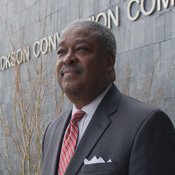Jackson Mayor Harvey Johnson Jr. said today that the city has made significant headway in returning water service to the city, but he warned that more breaks will appear as water pressure rises citywide.
The city has suffered 142 water line breaks since last week. By this morning work crews had repaired 114, leaving 28 still unrepaired. Municipal water pressure was at 59 psi, up from 40 psi yesterday, but still below the 65 psi required for all residents and locations to have access to running water.
"Nearly every area across the city should have some water," Johnson said at a morning press conference. "There may be some areas that are still near breaks that are without water or have very little pressure, but those should improve as the remaining repairs are made."
The mayor announced a goal of reaching 60 psi by the end of today, but he could not say when the city's water pressure would reach 65 psi. Johnson also said that he expects city crews to reduce the number of outstanding water main breaks by 20 percent today. Once citywide water pressure reaches 65 psi, the state Department of Health can begin testing water quality, a process that usually takes "a couple days," Johnson said. Only after MDH has approved the city's water will the boil water alert be lifted.
Other municipalities, including Greenville, Pearl, Madison and Richland, and many other suburban areas, are lending workers and water as the city struggles under round-the-clock repairs.
As water pressure rises in the city system, more breaks will likely appear, Johnson warned. He urged citizens to conserve water, boil all drinking water and report new line breaks as quickly as possible by calling the city's hotline at 601-960-1111.
The city will continue to distribute water at the Metrocenter mall, on Highway 80, until 2 p.m., although recipients must arrive in a vehicle to be eligible for the water. After 2 p.m., the city will use that water, which comes from the Mississippi Emergency Management Agency, for the Fire Department.
At a media briefing yesterday, Johnson said that he is not entirely surprised the city suffered massive ruptures in its water lines over the last three days due to sub-zero temperatures.
"We have miles and miles of waterlines, about 125 miles of water lines," Johnson said at a Wednesday morning press conference. "And these lines aren't young."
When asked why the central city suffered more problems with water breaks than the suburban communities, Johnson pointed to the age and sheer size of the city's system.
"We appreciate the efforts being afforded by the other cities, but the fact of the matter is Jackson's area is many, many times greater than the areas surrounding us, and they're better able to get their system back on line," Johnson said. "We have pipes older than some of the cities that have been incorporated around us. We've spent millions and millions of dollars upgrading it."
The city released a report Wednesday showing water system improvements between 1986 and 2009, reflecting a grand total of $177 million in replaced water lines and upgrades to the city's water treatment plant. The repair indicates upgrades in 446,142 feet of water lines. The 1997 water infrastructure upgrade plan shows a total of 574,780 feet of water transmission lines yet to replace, at an estimated cost of about $76 million.
Still, at Thursday's press conference, Johnson cautioned that no amount of repairs and infrastructure improvements could insure against a similar disaster in the future.
"I cannot guarantee this won't happen again," Johnson said. "I can't guarantee that we're not going to have this kind of weather visit our city again."
When a reporter suggested that Johnson's words were not comforting to citizens, Johnson replied that he was being realistic.
"I have to be truthful to people and get them to understand that this episode we're going through was not man-made," Johnson said.
"This was just as much of a natural disaster as a storm or a tornado hitting the city. And for people to think that it can be prevented somehow is very unrealistic. I can't guarantee you that. What I can guarantee you is that we're going to develop a system, the very best system we can to deliver water and sewer services to our citizens on an everyday basis that's of a higher quality. For me to stand here and say, 'Rest assured citizens, this will never happen again,' may be good hype it may be good political rhetoric, but it's not realistic."



Comments
Use the comment form below to begin a discussion about this content.
comments powered by Disqus